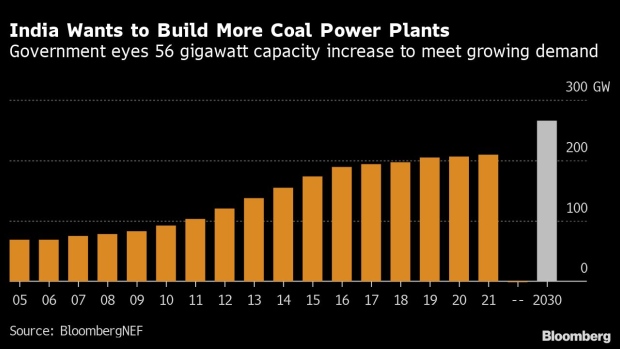Sep 23, 2022
India May Boost Coal Power Fleet 25% by 2030 Amid Rising Demand
, Bloomberg News

(Bloomberg) -- India plans to expand its coal power fleet by about a quarter through the end of the decade as it continues to lean on the fuel to meet growing demand until energy storage costs fall.
The world’s third-biggest emitter of greenhouse gases will add nearly 56 gigawatts of coal power capacity unless there’s a substantial drop in the cost of storing electricity, Power Minister Raj Kumar Singh said in an interview this week in New Delhi. India is also planning major investments in renewable energy, but it has to prioritize providing reliable power to spur economic growth, he said.
The plan underscores how energy security concerns are vying with climate targets as countries map out energy transition paths. Coal is enjoying a revival in Europe after Russian gas supplies fell in the fall-out from the invasion of Ukraine. India, which saw power demand surge this summer as temperatures rose to a record, is also delaying shutting older coal plants and increasing mining output.
“My bottom line is I will not compromise with my growth,” Singh said, adding that India will not hesitate to import coal to meet any shortfalls in domestic supply. “Power needs to remain available.”
READ: India May Delay Coal Plant Closures in Blow to Climate Action
Singh said his ministry is also pursuing a goal announced last year by Prime Minister Narendra Modi to have 500 gigawatts of clean power capacity by 2030 as the country seeks to reach net zero by 2070. Overall, India plans to nearly double its generation capacity from all sources to 820 gigawatts by 2030, he said.
To convert renewable energy into around-the-clock clean power, India will need access to cheaper energy storage solutions, Singh said, adding that his ministry will increasingly seek investment that combines wind and solar power with storage.
He blamed the developed world for not investing enough in storage technology and other decarbonization solutions, and said that China controlling the bulk of the world’s lithium supplies is a concern.
“It worries us,” Singh said, commenting on China’s dominance over the critical battery metal. “But the silver lining is there are other technologies that have emerged which are promising, especially for grid-scale storage. If that happens, the requirement for fossil fuels will disappear faster.”
©2022 Bloomberg L.P.






